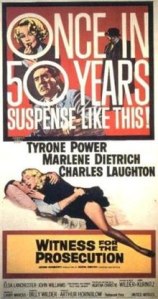
Wait till you see what I’ve found! The son of American war widow Elsa Jenner (Lizabeth Scott), young Erik (Jon Whiteley) and his friends are playing in the rubble of bombed-out post-war London’s buildings at Aldersgate when they locate a handgun buried in a brick. The gun goes off and one of the boys is shot and wounded. Erik goes on the run, believing he has killed his friend. A policeman relates the events to his mother and explains the boy who was shot is alive but in hospital. Efforts to locate Erik are aided by US Army Captain Mark Andrews (Steve Cochran) drafted into the investigation by Supt. Mackenzie (Herbert Marshall) of the Yard after it is discovered that the gun which Erik found was used in a murder of an American serviceman during the war. So a dangerous criminal currently unknown is potentially pursuing the boy. Erik goes to the cafe where his mother usually works but she is not there and leaves before he can eat food her colleague is getting for him when a man sees the gun in his pocket. He runs off again just before Elsa arrives with Cpt Andrews. As he gets closer to finding Erik, Andrews encounters Vivienne Pascal (Nicole Maurey) a dance-hall hostess with a connection to the gun’s original owner. But she has all but lost her faith in all things good, declaring I am dead. As Captain Andrews interviews her she is shot through the window by Henry. Andrews pursues him but is overpowered in an empty factory. Disturbed by a policeman Henry jumps out of a window into the Thames. As Andrews continues his investigation into the gun’s whereabouts, Erik’s mother Elsa finally locates her son with the helpful assistance of relative stranger Joshua Henry. He falsely alleges that Erik had stolen a bottle of milk from him. Henry starts wooing Elsa. Meanwhile, Erik sees his photo in the newspapers and continues his way across the city, trying to get food and pick up work as the hunt continues … We abide by their institutions and their methods. Who said the fatalistic world of noir couldn’t have children? This is one of the rare genre entries to break that rule. Children represent hope, an emotion that has no place in the rain slicked streets and smoky clubs with their tough gangsters, private eyes, molls and femmes fatales. And here the same kind of story told in The Yellow Balloon is dramatised with verve and energy. From Blackfriars Bridge to Covent Garden, all around St Paul’s Cathedral and Lambeth, the city is shot schematically and expressively, tracking different characters as the quest story unfolds. Hard man Cochran gets a good role – both detective and romancer, even if at the conclusion he’s late to the party. To be a detective you must by silent and secret. You can’t give anything away. Cole is a true villain, a deceitful crim with murder on his mind, a step away from the hilarity of the jolly spiv he usually essays with the St Trinians girls. The kids here have met a properly evil man who tries to have his way with Elsa to get to Erik. Maurey has a nice sequence in which she gets to utter the truly grim sentiments of the genre, the polar opposite to the mothering instincts of Scott in one of a couple of British films she took at the time. Whiteley is impressive in another of the exceptional child characters he played in his brief career. There’s a tremendously compelling sensibility at work here: the nasty depths of human behaviour represented across the geography of London when it was still murky and foggy, wet and damp, replete with double decker buses, curious onlookers, in the process of rebuilding itself after the War and not quite at one with modernity, filled with the detritus of war for kids to get killed. Incredibly exciting, vividly staged and shot, this is an unusual and excellent film noir, shot around London’s East End and at Nettlefold Studios by Reginald H. Wyer with production design by John Stoll. Thanks to the ever excellent Talking Pictures for screening it. Directed by Val Guest with uncredited work by producer Hal E. Chester who co-wrote with Fred Freiberger. Why don’t you stop working so hard at being tough?














